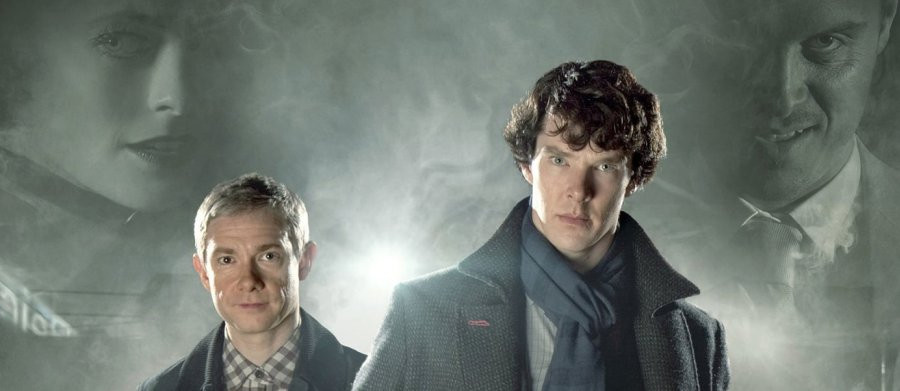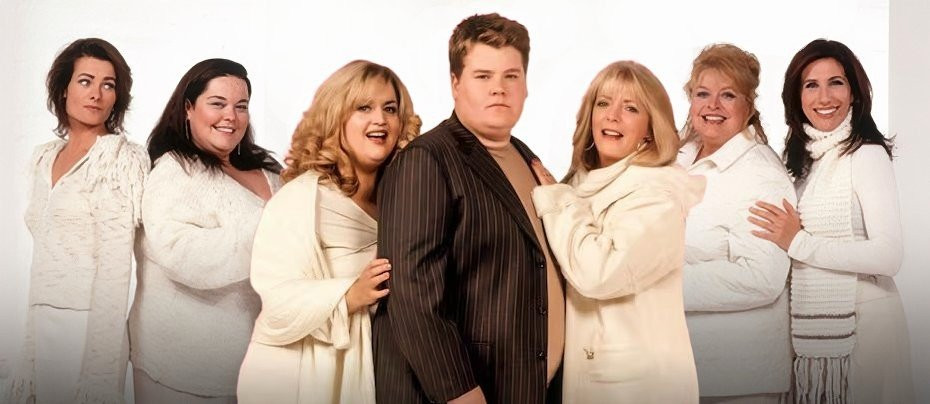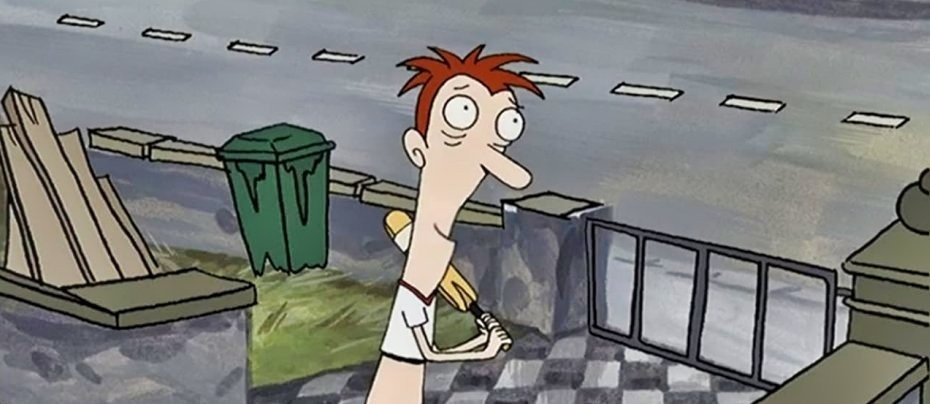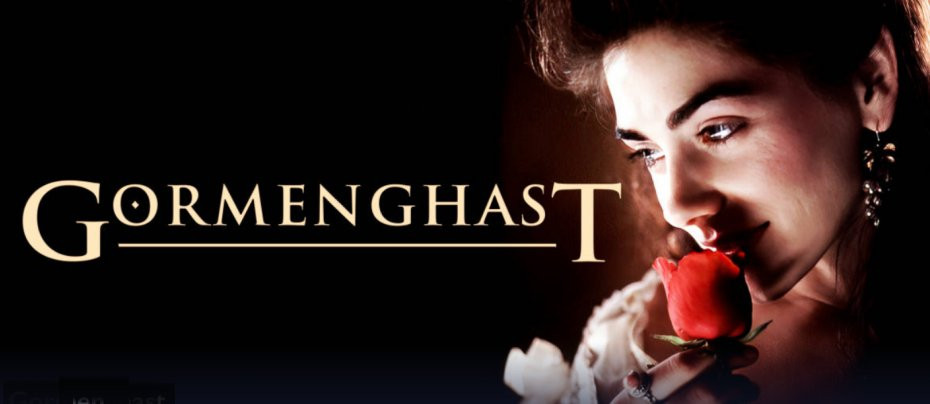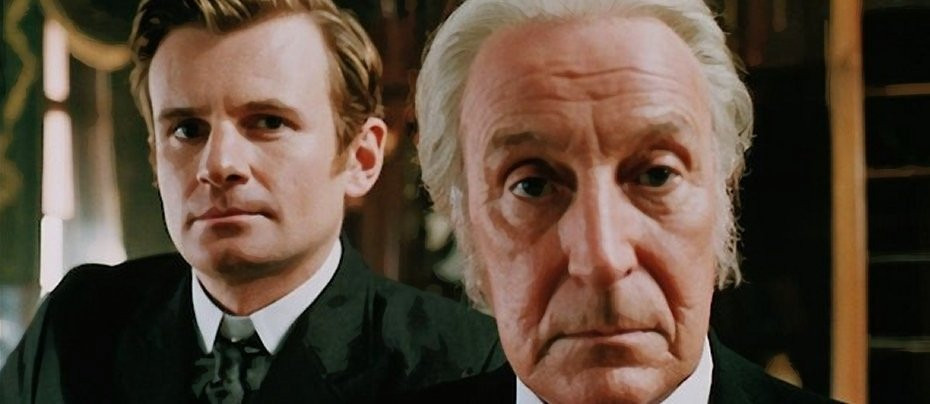
Murder Rooms: The Dark Beginnings of Sherlock Holmes
2000 - United KingdomTaking the wonderfully simple concept that the young doctor, Arthur Conan Doyle and his brilliant tutor, doctor of forensic medicine Joseph Bell, joined forces to solve complex and bewildering crimes during the glory days of queen Victoria's mighty empire, Murder Rooms: The Dark Beginnings of Sherlock Holmes has triumphantly succeeded in ringing a wonderfully inventive change on the already much mined cannon of the master detective.
Effortlessly equating the real life historic figures of Doyle and Bell with the formers fictional doctor and consulting detective, series creator and head writer, David Pirie, successfully managed to mix and match elements of reality and Holmesian inspired fiction into an effective series of darkly murderous, intelligently crafted adventures. Adventures that made full use of the BBC's now legendary flair for expertly mounted and produced drama in an historic setting.
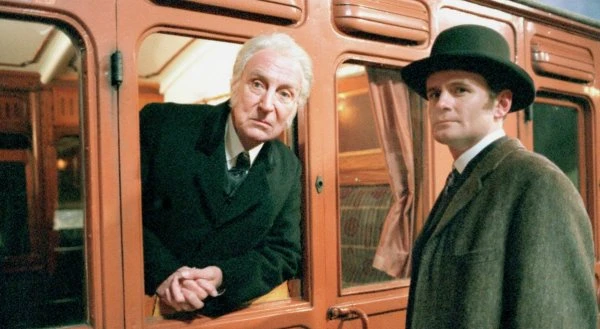
The Dark Beginnings of Sherlock Holmes first appeared as a two-part drama on BBC 2 in January 2000, laying the foundation for what was to come by exploring in finely observed detail, the first meeting between Arthur Conan Doyle (Charles Edwards) and the intellectually remarkable man who was fated to become his mentor, Doctor Joseph Bell (the wonderful Ian Richardson, who has previously portrayed Holmes himself in four feature length TV movies), in the Edinburgh of 1878 -and the two horrifying cases which would act as the touchstone that would eventually lead to the creation of a literary legend.
The series gained instant critical and audience acclaim, which saw a rapid commission for a full series, and a shift to the wider viewing audience of BBC1. Premiering on Tuesday September 4th, 2001, the traditional opening week of the BBC's autumn schedule, the first of the series of four 90-minute episodes rejoined the characters three years following the events of the original drama. Doyle, having qualified and left university, but struggling to make his mark as a doctor on the South coast of England, finds himself, along with the ubiquitous Bell, being drawn deeply into the shadowy darkness which lurks just beneath the polished, civilised veneer of Victorian society.
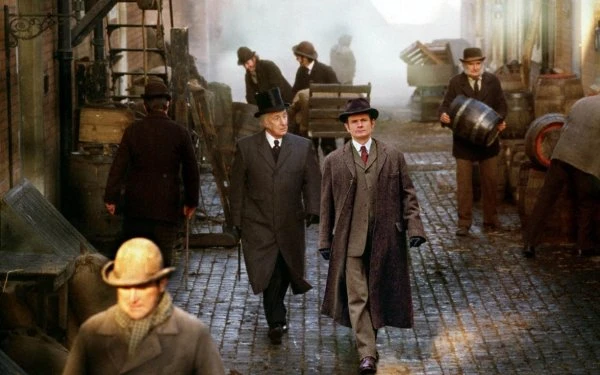
Aside from the clever and intricately plotted appeal of the mysteries themselves, the core strength of the series lays in the crucial central relationship existing between the impulsive, often frustrated, younger man and the deductively brilliant older doctor. Credibility is lent to each story by knowing that in true life Bell was the person responsible for opening Conan Doyle's eyes to the world of forensic pathology, a fact that Conan Doyle acknowledged by dedicating 'The Adventures of Sherlock Holmes' (1872) to his mentor by writing 'It is to you that I owe Sherlock Holmes'. As actor Ian Richardson said when discussing his role in the series, "There is no actual evidence that Conan Doyle ever worked on any investigations with Bell, although we do know that Bell was assisting Edinburgh police as a pathologist, moonlighting from his day job as a professor of medicine at Edinburgh University. It was customary for Bell to choose from each year's intake of students one candidate to serve as his secretary and general dogsbody. Conan Doyle got the job so it's reasonable to assume that he would have assisted Bell in some of his police work, simply on the grounds that he was around all the time."
With Doyle's own father suffering from a serious mental illness, Bell went beyond mere teacher to become Doyle's touchstone for moral guidance, being a literal father figure in both the personal and the educational sense. But Bell too had his own reason for needing Doyle's friendship. His wife had died in childbirth from peritonitis, and his surviving son, having grown up and joined the army had by a cruel twist of fate, died of the same illness. "This," says Richardson, "is the key. Here is a man who has lost his son and heir, and here is a young Conan Doyle who has lost his father."
Another highpoint of the series is the subtle and inventive use of foreshadowing, to allow elements that the viewing audience instantly recognise as future components of the Holmes stories, to colour the events in which the duo find themselves embroiled. Praise for the series has been unanimous on both sides of the Atlantic, and deservedly so. A wealth of top class performers has graced the series in featured roles. Amongst them: Charles Dance, Alexander Armstrong, Claire Holman, Roger Lloyd-Pack, Rik Mayall, John Sessions, David Hayman, Malcolm Sinclair, and the wide ranging talent of Annette Crosbie.
Aside from contributing the opening story of the new series, creator David Pirie handed the scripting for the remaining episodes over to three experienced, and highly gifted writers: Paul Billing, well regarded for work on the award winning Prime Suspect series, wrote 'The Photographer's Chair,' best-selling author and screenwriter, Stephen Gallagher, wrote 'The Kingdom of Bones,' and the consistently excellent Daniel Boyle, award-winning writer of Inspector Morse and Hamish Macbeth offered up the wonderful 'The White Knight Strategem.'
Polished, professional, and possessing two superbly cast central performers and the panache and verve of BBC drama at its most creative, Murder Rooms: The Dark Beginnings of Sherlock Holmes is a quintessential detective series which graces the genre with a genuine new slant on a much loved and revered formula.
Seen this show? How do you rate it?
Seen this show? How do you rate it?
Published on January 9th, 2019. Written by Humar (2001) for Television Heaven.




